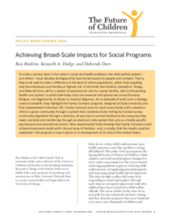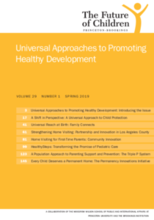Displaying 111 - 120 of 506
In France more than 140 000 children live in foster homes under the responsibility of the French Child Protection Agency. These children have lived in environments that cannot be good for their development and have been separated from their families which have to have consequences on their mental development. A literature review in France and abroad was made to identify the profiles of these children, their risk factors, and the mental disorders they can present.
The purpose of this study is to confirm whether the effectiveness of the program is sustainable 9 months after project completion for the children and adolescents participating in a childcare and rehabilitation support project.
This podcast episode describes what self-harm is and how social workers can support young people and carers who are self-harming.
In this brief, Ron Haskins, Kenneth A. Dodge, and Deborah Daro call for a system of psychosocial care for young families in the US, highlighting the the Family Connects program which aims to reach every family with a newborn child in a given community through a system that combines home visiting by trained nurses; community alignment through a directory of services to connect families to the resources they need; and data and monitoring through an electronic data system that acts as a family-specific psychosocial and educational record.
This volume explores universal social programs designed to serve entire communities as they move toward achieving population impact in reducing child maltreatment, strengthening parental capacity, and improving infant health and development.
In a sample of 136 Romanian children from the Bucharest Early Intervention Project (BEIP), who were exposed to early psychosocial deprivation in the form of institutional care, the authors of this study examined caregiver-reported and observer-rated signs of disinhibited social engagement disorder (DSED).
This paper considers the importance of material objects for looked after and adopted children integrated as part of life story work practices.
This study investigated what factors are associated with an improvement in quality of life (QoL) during residential stay for children and adolescents living in youth welfare institutions in Switzerland.
The present study examined the association between family resources and mental health as mediated by personal psychological resources (PPRs) for left‐behind children (LBC).
This study examined associations between perceived support from adults in three developmental contexts (home, school and neighbourhood) and mental well-being (life satisfaction, self-concept, optimism) among grade four children living with foster parents in British Columbia (B.C.), Canada.


